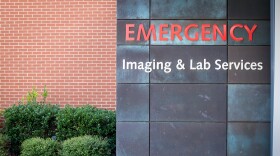Much of the scene at this drive-through testing site in Kenly has become familiar. Health care workers asking for last names, telling folks which tent to pull up to.
The workers are fully kitted up in protective gowns, gloves, masks and face shields, and ŌĆö despite the searing sun ŌĆö are giving mask-muffled instructions to a steady stream of motorists before their swab tests.
But this pop-up testing site is far from any major population center. ItŌĆÖs at an elementary school amid the soybean and tobacco fields of Northeastern Johnston County.
State health officials have just added a third contractor to expand a new COVID-19 testing effort. They're setting up hundreds of temporary testing sites ŌĆö like this one ŌĆö aimed at reaching minority populations hard hit by the pandemic.
Shannon Dowler is Chief Medical Officer for NC Medicaid, whose helping oversee the program.
ŌĆ£With African American and Latinx, both morbidity and mortality is significantly worse than Caucasians,ŌĆØ Dowler said. ŌĆ£As much as six times more likely to die from a COVID infection.ŌĆØ
She said when these inequities emerged, state health officials began trying to figure out how to attack them. They discovered key geographic areas lacked testing sites.
Like in this part of Johnston County, which has a significant Latino population.
ŌĆ£So, we wanted to make sure that communities in North Carolina that had a high percentage of historically marginalized populations and no testing site, that we brought testing sites to that community,ŌĆØ Dowler said.
So the state has hired contractors including Vidant, which operates a major healthcare system in Eastern North Carolina. These partner with local organizations like county health departments in setting up the temporary sites.
Dowler said results from the first few days are encouraging.
ŌĆ£When we're looking at the demographics so far, depending on the testing site between 50 and 80% of the people presenting are from the African-American population and around 10% are, you know, Latinx or other populations? So, hitting our goal,ŌĆØ Dowler said.
The no-cost testing events will make regular appearances in some places, and pop up just once in others.
Dowler said that if the three-week initiative is successful, it could be extended well into August and include up to 600 testing events.









